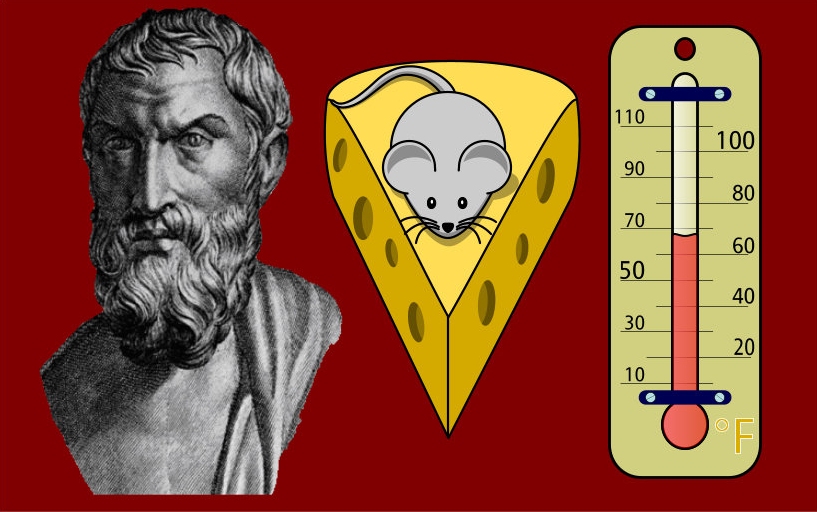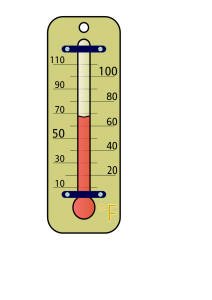Of Mice, Syllables, Thermometers, and The Complete Life
Suppose you are talking with a friend who knows next to nothing about formal philosophy. You tell him that you have been reading about Epicurus, and what you have read makes a lot of sense. Then your friend says:
“I have heard that Epicurus once wrote, ‘By pleasure we mean the absence of pain in the body and of trouble in the soul.’ That sounds very strange to me, and I don’t know what that means about how I should live my life. Does that mean that if I make like a monk, assume the lotus position, clear my mind, tell myself that nothing makes any difference to me, nothing can cause me pain unless I let it, and I want nothing from life other than silence and pure inactivity, I will experience a sensation of the most intense pleasure I have ever felt in my life? Especially if I start to hum? And that I should spend my life doing this?”
The proper response to such a question would probably start with something like this: “What you have to remember is that Epicurus had a lot to say about pleasure. When he wrote that, he expected the reader to understand that __________.
Over time I hope to add to this post to make it a list of important things to remember about the nature of pleasure. But first I want to show how this question relates to a complaint raised by Seneca in Letters – Book II Letter XLVIII. In the following passage, Seneca was complaining to Lucilius about those philosophers who play games with words:
“And on this point, my excellent Lucilius, I should like to have those subtle dialecticians of yours advise me how I ought to help a friend, or how a fellowman, rather than tell me in how many ways the word “friend” is used, and how many meanings the word “man” possesses. Lo, Wisdom and Folly are taking opposite sides. Which shall I join? Which party would you have me follow? On that side, “man” is the equivalent of “friend”; on the other side, “friend” is not the equivalent of “man.” The one wants a friend for his own advantage; the other wants to make himself an advantage to his friend. What you have to offer me is nothing but distortion of words and splitting of syllables. It is clear that unless I can devise some very tricky premises and by false deductions tack on to them a fallacy which springs from the truth, I shall not be able to distinguish between what is desirable and what is to be avoided! I am ashamed! Old men as we are, dealing with a problem so serious, we make play of it! ‘Mouse’ is a syllable. Now a mouse eats its cheese; therefore, a syllable eats cheese.” Suppose now that I cannot solve this problem; see what peril hangs over my head as a result of such ignorance! What a scrape I shall be in! Without doubt I must beware, or some day I shall be catching syllables in a mousetrap, or, if I grow careless, a book may devour my cheese! Unless, perhaps, the following syllogism is shrewder still: “‘Mouse’ is a syllable. Now a syllable does not eat cheese. Therefore a mouse does not eat cheese.” What childish nonsense! Do we knit our brows over this sort of problem? Do we let our beards grow long for this reason? Is this the matter which we teach with sour and pale faces?”
Why would it be wrong to conclude “a syllable eats cheese”? The reason you would never conclude that a syllable eats cheese is that you know from the beginning that “mice” are not fully and completely defined by the word “syllable.”
Let’s move to thermometers. In the nearby graphic, we have a classic mercury thermometer. By design, the thermometer registers temperature when the mercury expands or contracts according to surrounding temperature. At no time does the mercury “mix” with the air (I am going to call it “air” here, but more accurately it is probably a partial vacuum) – the boundary always remains clear and discrete. The maximum temperature that can be registered is when the mercury expands to compress the air into the smallest possible space, effectively minimizing the air to zero. The limit of the temperature reading is the total absence of compressed air, and where mercury is, air is not.
Keep that in mind when reading Principle Doctrine Three: The limit of quantity in pleasures is the removal of all that is painful. Wherever pleasure is present, as long as it is there, there is neither pain of body nor of mind, nor of both at once.
Unfortunately, there is a terrible habit in modern discussion to say that Epicurus held that “the highest pleasure IS the mere absence of pain” [my emphasis]. You should no more think that Doctrine Three means that the goal of life “is” the “mere absence of pain” than if you were to look at a thermometer and think you have made a profound statement about the universe by looking at a thermometer and saying only, “the highest temperature IS the absence of air.” Such a statement would be tunnel-vision in the extreme. It is certainly true that, looking only at the thermometer itself and disregarding the reason for the reading, the highest reading on the thermometer occurs when the air occupies minimum space, and the mercury expands to maximum space. But to transmute this simple observation into a general conclusion about how the thermometer is being used or the full significance of the reading would be ludicrous. The purpose of a thermometer is to measure temperatures of relevance to us as human beings. The causes of those measurements, and their full significance to us, will vary depending on whether they arise from a nuclear explosion or a refrigerator icemaker. The full significance of the thermometer reading will have innumerable important instances and aspects, and will depend on the nature of mercury, just as “pleasure” has innumerable instances and aspects, and depends on the nature of the positive activities which comprise pleasure. To separate out “the absence of air” and conclude that this description is all we need to know about the nature of mercury, and of temperature, would be total folly.
If you freeze your mind when you say “a mouse IS a syllable,” and you accept that sentence superficially, then just as in Seneca’s complaint complaint you will fall prey to the folly of thinking that syllables and books can eat cheese. If you blankly stop thinking about the context of your life as a whole and the nature of plesaure, then when you hear “the highest pleasure IS the absence of pain,” you will fall prey to the hazard of thinking that Epicurus was a hyper-Stoic. You will think that there is some mystical state of “the highest experience of pleasure in life,” and that this state is completely defined as “the absence of pain.” And if you are particularly earnest and literal (which are generally good traits) you will begin to calculate the size of your monk outfit, and you will start practicing how best to empty your mind and convince yourself that pain makes no difference to you.
It was extremely important to Epicurus that we not play games with words: “In the first place, Herodotus, you must understand what it is that words denote, in order that by reference to this we may be in a position to test opinions, inquiries, or problems, so that our proofs may not run on untested ad infinitum, nor the terms we use be empty of meaning. For the primary signification of every term employed must be clearly seen, and ought to need no proving; this being necessary, if we are to have something to which the point at issue or the problem or the opinion before us can be referred.”
This is the framework we need to keep in mind when we encounter Epicurus’ statement in his letter to Menoeceus, which is translated as “By pleasure we mean the absence of pain in the body and of trouble in the soul.”
It would take an expert in ancient Greek to determine whether this translation is faithful to the original. But it does not take an expert in ancient Greek to observe what Epicurus had previously said about the nature of pleasure in the works that form the essential foundation for the letter to Menoeceus.
Doctrine Three cited above makes sense only if pleasure is considered to be a measuring faculty, or “sense,” which produces sensations and experiences. Doctrine three makes no sense if we think of pleasure as a “thing” or a “state” which we can reach at any one particular moment.
If pleasure were strictly a “thing,” it would be true that pleasure has no limit, because there are no limits to the numbers of “things” which we find pleasurable in life. We find pleasure in looking at a beautiful flower, and there are unlimited numbers of beautiful flowers which can bring us pleasure by looking at them. Epicurus specifically says this in Doctrine 20. The flesh receives as unlimited the limits of pleasure; and to provide it requires unlimited time. But the mind, intellectually grasping what the end and limit of the flesh is, and banishing the terrors of the future, procures a complete and perfect life, and we have no longer any need of unlimited time. Nevertheless the mind does not shun pleasure, and even when circumstances make death imminent, the mind does not lack enjoyment of the best life.
But what Epicurus also says in Doctrine 20 is that the mind is capable of understanding the “limits” of our nature as humans. The nature of pleasure is that it is a faculty given to us by Nature for guidance, and not a set of objects which have intrinsic value as “pleasure in themselves.” Pleasure does not exist in one or any number of things, but as a faculty we are to follow throughout life. From this perspective, the meaning of living a full and complete life is to follow pleasure intelligently, from birth to death, whatever our circumstances. When our end comes at death, if we have followed pleasure intelligently throughout our lives, we have carried out the complete goal of Nature in bringing us to life. And this is the case even though there are innumerable flowers left unsmelled and chocolate pies left untasted.
Another way it may help to see that pleasure is not a “thing,” is that pleasure does not lend itself to exact quantification or description, as does a slice of pie. In cooking, we can slice a pie and state with confidence that the pieces are at least roughly identical. In mathematics, we can postulate that “A = B,” and assume that this means equal in every aspect. We can then number identical things as units. We can say, for example, that two slices of pie are larger than one, or that in the numbers 1 to 100, the number 100 is “highest.” In math or with “things,” we can give a complete scientific definition of “the highest number” or the largest slice of pie. This kind of quantification is not possible with a faculty such as pleasure. The number of types and intensities of pleasure are innumerable. Aristotle and Plato were wrong – there is no higher sphere of perfect forms, and there are no “essentials” by which we can judge “virtue” or “highest goal” without knowing the full context of the real, individual circumstances. There is no discrete boundary between shades of color or species of animals, other than what we assign in our own minds. In an eternal and unbounded universe composed of combinations of atoms and void, there is no supernatural ranking by which we can say that some particular experience is “the highest” and toward which we should strive. Experiencing full and complete pleasure in life does not consist of existing in any single static “state” – mystical or otherwise. Experiencing full and complete pleasure in life means so ordering all of one’s mental and physical activities so as to follow intelligently all during life, from birth to death, the guidance of the faculty of pleasure.
————————-
There are many more points of reference for this other than Doctrines Three and Twenty. I will list more here (and hopefully increase the list over time):
** Early in the letter to Herodotus, the most basic statement of Epicurean theory left to us, Epicurus had written: “Next, we must by all means stick to our sensations, that is, simply to the present impressions whether of the mind or of any criterion whatever, and similarly to our actual feelings, in order that we may have the means of determining that which needs confirmation and that which is obscure.” This phrase which is translated as “feelings” in this version is generally held by commentators to be a reference to “the passions“, or, as we refer to it today, the faculty of pain and pleasure. The point to be observed is that Epicurus is equating pleasure as a faculty of the same type as the “sensations”, which is held to mean the five senses – seeing, hearing, touching, tasting, smelling. Throughout his writing, Epicurus refers to pleasure not as a “thing” but as a sensation given to us by Nature. A piece of chocolate cake can be a pleasure to us, or it can be an instrument of torture to a starving man separated from it by a pane of glass. One piece of pie can cause us great pleasure; eating one hundred pieces of the same pie at one time would be extremely painful. There is nothing in the nature of any particular thing that makes it intrinsically a pleasure or a pain to us – what we call pleasure is a sensation that we perceive due to our natural makeup as human beings.



